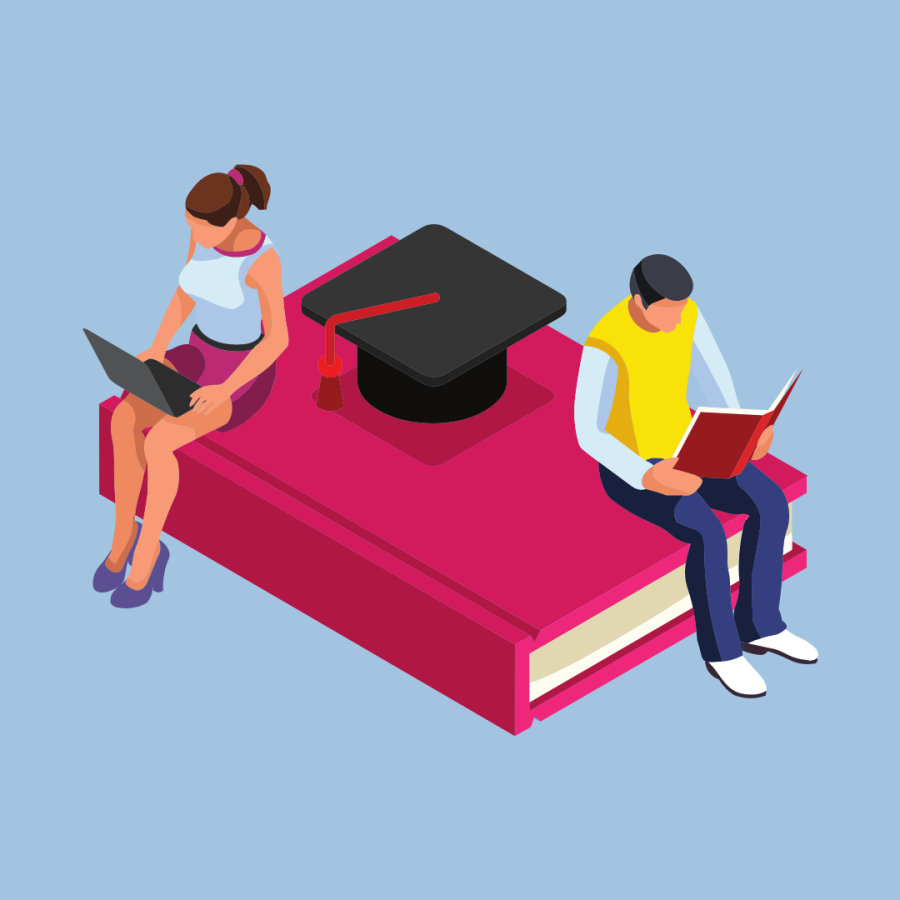Freshman Gaels chat about education and Chat GPT
The current freshmen class is feeling the long-tern effects of the pandemic on their college education, and some are even using Chat GPT as a solution to their academic struggles.
March 31, 2023
In March of 2020, everyone was sent home from school, and it wasn’t because of some rebellious act or some dress code violation—it was because the world had turned upside down. The COVID-19 pandemic took students out of already not-so-good classrooms and forced them into even less ideal learning environments: their homes.
The COVID-19 lockdown set back students learning, hindering the vitality of education in their lives. During that time, students were either learning the bare minimum, or nothing at all—there was no structure to learning and no stress on the significance of education. While the education system tries to return to its state of normality, students who missed close to 2 years of essential instruction feel the effects of education’s absence during those times.
The current freshman class at Iona is one of the largest classes Iona has ever had. Among these freshmen are different recounts of the COVID-19 pandemic and its effect on education, so I took the time to speak with some of these students to hear their stories. I spoke with five students about education, and the pressures that push them to use software such as Chat GPT. They agreed to speak to me on the condition of anonymity.
The conversation started with some of the students admitting their use of Chat GPT. Two of the five said they used Chat GPT for comprehension reasons.
“I use it to summarize some of the course material in my classes,” one said. “I struggle with reading, so Chat GPT helps me understand the content better because it briefly summarizes things.”
One of the students said she did not know what Chat GPT was, and the others said they had heard about it in class but never used it. While none of them used Chat GPT to complete an assignment, they all said they could understand why other students would. Thus, the conversation switched from solely focusing on the use of Chat GPT to the apparent discrepancies in their education resulting from the lockdown and remote learning or lack thereof.
They all agreed that the pandemic, which had sent them home from school for close to a year, even longer for some, had contributed to their lack of motivation and overall academic fatigue. One said that he did not even go to his classes during the pandemic, he would just try to complete some of his assignments in his own time.
“I didn’t go to school,” he said. “The only reason I graduated was because I had to write an essay explaining how the pandemic caused me to have bad grades so they could let me pass.”
He is one of the students who uses Chat GPT for comprehension—between commuting 2 hours to Iona and working for his family, it is hard for him to find time for school assignments. He said he does not have much time to read all of the assigned readings or long essay prompts, so he will use Chat GPT for a synopsis of these assignments.
All of the students said that they felt unprepared in comparison to some of their other classmates. These four students are people of color, and all went to high schools in the Bronx; upon coming to Iona, they realized how different their education was from some of the other students, who either where white or went to private schools.
“I feel like all of the other students come into class and automatically know what to do,” one said. “I feel their education definitely prepared them better for college.”
They feel they struggle not only because of the pandemic, but also because of the schools they went to. The schools did not prepare for college as much as they believed it would and most of the students attribute this mishap to the pandemic.
The students who claimed to have never used Chat GPT said that they are behind on class work and essays, and no longer feel motivated to continue their studies. They also blamed their short attention span for their academic shortcomings. They all said that Chat GPT seems like an easy way to get assignments out of the way, but they think the chatbots writing is not advanced enough to actually portray a college-level essay.
One of the students admitted to not entirely caring about her college education but feeling forced to stay because of her parents.
“I am a first-generation college student,” she said. “My parents would kill me if I didn’t finish school. I don’t really want to be here, but I am because of my parents.”
I concluded our group conversation by asking if they felt smart. Some of them said they considered themselves as “street smart” as opposed to “book smart.” Others said they weren’t smart at all—a heartbreaking and certainly inaccurate conclusion. Yet, they all agreed to feel lost in their academics, saying that they weren’t certain of their writing and reading comprehension abilities.
“I feel I know as much as I need to know,” one said—the others shook their heads in agreement. “But I could always learn more.”









